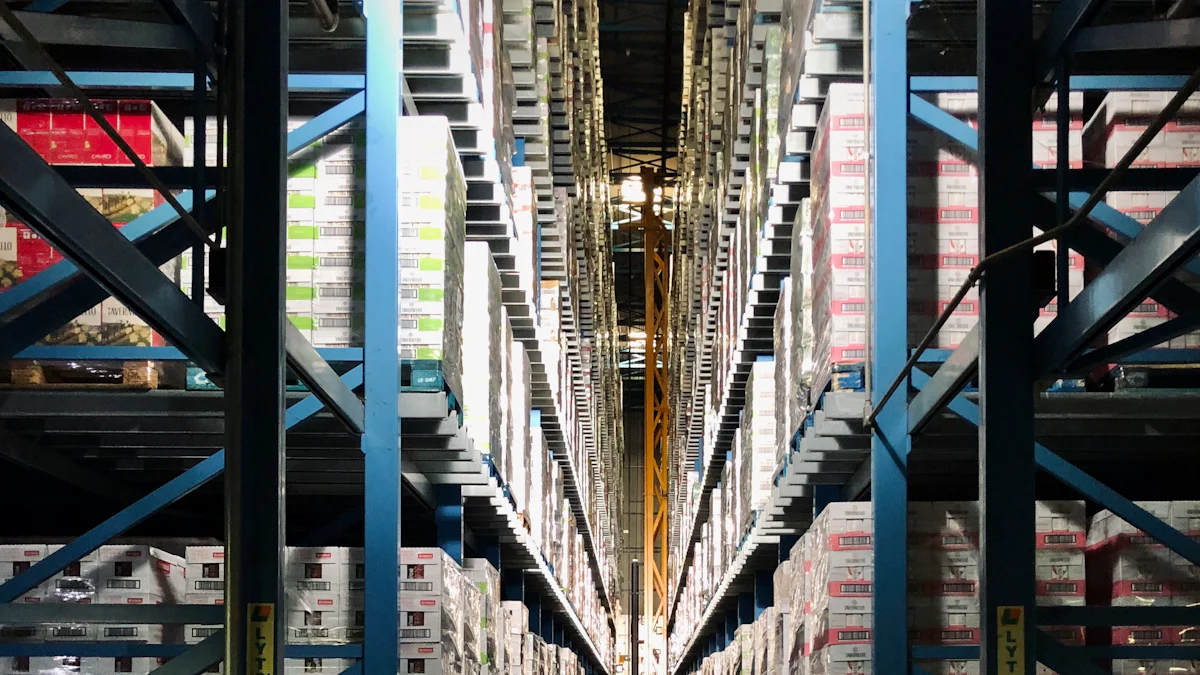The Untapped Potential: AI in Logistics Unraveled

Artificial intelligence logistics has revolutionized the logistics industry, optimizing supply chains and enhancing operational efficiency. In modern supply chains, the integration of artificial intelligence logistics is paramount for streamlining processes and meeting customer demands effectively. This blog will delve into the transformative impact of artificial intelligence logistics, focusing on key areas such as demand forecasting, supply chain management optimization, and operational efficiency improvements.
The Role of AI in Logistics

In the realm of logistics, artificial intelligence logistics plays a pivotal role in enhancing various aspects of operations. From demand forecasting to supply chain management and operational efficiency, AI technologies are revolutionizing the way logistics processes are conducted.
Enhancing Demand Forecasting
When it comes to enhancing demand forecasting, predictive analytics powered by AI algorithms have become indispensable tools for logistics companies. By analyzing historical data and market trends, predictive analytics enable organizations to anticipate customer demands accurately. This proactive approach allows for better resource allocation and inventory management strategies.
Predictive Analytics
The implementation of predictive analytics enables companies to forecast demand patterns with precision, leading to optimized inventory levels and reduced instances of stockouts or overstocking. By leveraging AI-driven predictive models, logistics firms can align their production schedules with anticipated demand fluctuations effectively.
Resource Planning
Resource planning is another critical aspect where AI contributes significantly to logistics operations. Through sophisticated algorithms, artificial intelligence logistics aids in determining the optimal allocation of resources such as manpower, vehicles, and storage facilities. This streamlined resource planning process ensures efficient utilization of assets while minimizing wastage and operational costs.
Optimizing Supply Chain Management
Efficient supply chain management is essential for the seamless flow of goods from suppliers to end customers. With AI integration, logistics companies can optimize their supply chain processes for improved performance and customer satisfaction.
Logistics KPIs Analysis
AI-powered tools facilitate in-depth analysis of key performance indicators (KPIs) within the logistics domain. By scrutinizing metrics related to delivery times, order accuracy, and inventory turnover rates, organizations can identify areas for improvement and implement targeted strategies to enhance overall operational efficiency.
Efficient Product Shipping
In the competitive landscape of modern logistics, timely and cost-effective product shipping is crucial for maintaining a competitive edge. AI technologies enable route optimization, real-time tracking capabilities, and dynamic rerouting options based on traffic conditions or unforeseen disruptions. These advancements streamline shipping processes and ensure prompt deliveries to customers.
Improving Operational Efficiency
Operational efficiency lies at the core of successful logistics operations. Through the deployment of AI-powered solutions, companies can streamline workflows, automate repetitive tasks, and enhance overall productivity across various operational functions.
AI-Powered Robots
The integration of AI-powered robots in warehouse operations has revolutionized inventory management processes. These robots efficiently handle tasks such as sorting, picking, packing, and organizing inventory items with precision and speed. By automating these labor-intensive activities, organizations can achieve higher throughput rates and minimize errors in order fulfillment procedures.
Inventory Management
Effective inventory management is vital for preventing stockouts or excess inventory situations that can impact profitability. AI algorithms analyze historical sales data, seasonal trends, and market dynamics to optimize inventory levels proactively. This data-driven approach ensures that warehouses maintain adequate stock levels while avoiding unnecessary holding costs associated with surplus inventory.
AI-Driven Innovations

Route Optimization
In the realm of logistics, artificial intelligence logistics has paved the way for innovative solutions in route optimization. By leveraging AI-powered navigation systems, companies can streamline trucking routes and overcome logistical challenges effectively. These systems utilize advanced algorithms and predictive analytics to calculate the most efficient routes and logical stop sequences, minimizing drive time and increasing fuel efficiency.
Traffic Analysis
AI algorithms process comprehensive datasets, including delivery addresses, times, traffic patterns, and weather conditions to facilitate the creation of optimized delivery routes. This data-driven approach not only shortens lead times but also minimizes transportation costs by ensuring that vehicles take the most efficient paths based on real-time information.
Risk Management
Artificial intelligence logistics offers cutting-edge tools for risk assessment and enhancing supply chain resilience. Generative AI plays a crucial role in accurately assessing risks beyond traditional models, providing organizations with valuable insights to mitigate potential disruptions effectively.
Generative AI for Risk Assessment
By analyzing historical data and real-time information, AI-powered systems can anticipate demand patterns, inventory fluctuations, and potential disruptions. This proactive approach enables organizations to optimize inventory levels, minimize stockouts, and streamline supply chain operations efficiently.
Enhancing Supply Chain Resilience
AI-driven risk management strategies bolster supply chain resilience by identifying vulnerabilities and implementing proactive measures to mitigate risks. Through predictive analytics and scenario planning, organizations can enhance their ability to adapt to unforeseen circumstances while maintaining operational continuity.
Sustainability Efforts
Sustainability is a key focus area where artificial intelligence logistics excels in optimizing processes for reduced environmental impact. By optimizing routes for fuel reduction and implementing eco-friendly practices, AI-driven systems help minimize the carbon footprint associated with transportation operations.
Route Optimization for Fuel Reduction
AI algorithms analyze data to optimize production processes and logistics for reduced environmental impact. By identifying the most fuel-efficient routes based on traffic conditions and other variables, companies can achieve sustainability goals while reducing operational costs.
Eco-Friendly Practices
Incorporating eco-friendly practices into logistics operations is essential for promoting sustainability. AI technologies enable companies to adopt environmentally conscious strategies such as alternative energy sources, waste reduction initiatives, and green packaging solutions to minimize their ecological footprint.
Future Prospects of AI in Logistics
Predicting Market Trends
Predicting market trends is a crucial aspect where artificial intelligence logistics showcases its transformative potential. By leveraging advanced algorithms and predictive analytics, businesses can gain valuable insights into consumer behavior, demand patterns, and industry trends. This proactive approach enables companies to anticipate market fluctuations and adjust their strategies accordingly for optimal performance.
Demand Prediction
Demand prediction plays a pivotal role in ensuring efficient supply chain operations. Through the utilization of AI-powered systems, organizations can analyze historical data, real-time market trends, and customer preferences to forecast demand accurately. This data-driven approach empowers businesses to align their production schedules, inventory levels, and distribution channels with anticipated demand, enhancing overall operational efficiency.
Logistics Planning
Effective logistics planning is essential for seamless product delivery and customer satisfaction. With AI integration, companies can optimize route planning, warehouse operations, and transportation management for streamlined logistics processes. By harnessing the power of AI algorithms, businesses can enhance delivery speed, reduce lead times, and minimize operational costs through efficient resource allocation.
Cost Reduction
Cost reduction is a primary goal for businesses across industries, and artificial intelligence logistics offers innovative solutions to achieve this objective effectively. By automating tasks, optimizing processes, and minimizing human errors, AI technologies contribute to significant cost savings in logistics operations. This streamlined approach enhances efficiency while reducing operational expenses for improved profitability.
Decreasing Transportation Costs
One of the key areas where artificial intelligence logistics excels is in decreasing transportation costs. By analyzing traffic patterns, weather conditions, and delivery routes using AI algorithms, companies can identify the most efficient paths for transportation. This optimization not only reduces fuel consumption but also minimizes vehicle maintenance costs associated with prolonged travel distances.
Saving Money
The implementation of AI in logistics translates into tangible cost savings for businesses looking to streamline their operations. By optimizing inventory management processes, enhancing supply chain visibility, and automating repetitive tasks through AI-powered solutions, companies can achieve substantial savings in labor costs and operational expenses. This strategic use of technology ensures long-term financial sustainability while driving business growth.
Increased Productivity
Enhancing productivity is a key benefit of integrating artificial intelligence logistics into supply chain operations. Through advanced planning tools, forecasting models, and automated workflows powered by AI technologies, organizations can boost productivity levels across various functions within the logistics domain.
Planning and Forecasting
Efficient planning and forecasting are essential components of successful logistics operations. With AI-driven tools at their disposal, businesses can create accurate production plans based on demand forecasts and market trends. This proactive approach minimizes stockouts or overstocking situations while ensuring that products are readily available to meet customer demands promptly.
Lower Operational Costs
Reducing operational costs is a top priority for logistics companies aiming to improve profitability without compromising service quality. By implementing AI algorithms for route optimization, inventory management enhancements,
and resource allocation strategies based on real-time data analysis,
organizations can lower operational costs significantly.
This optimized approach leads to higher efficiency levels,
streamlined workflows,
and ultimately lower overhead expenses
across the entire supply chain network.
AI's transformative impact on logistics is evident through enhanced route optimization and supply planning. By employing sophisticated algorithms to analyze various factors like traffic patterns and production schedules, AI streamlines operations, minimizes costs, and reduces environmental impact. The future of logistics lies in AI-driven decision-making, promising increased efficiency and customer satisfaction. Embracing AI technologies will not only revolutionize the industry but also pave the way for a more sustainable and successful logistics ecosystem.
See Also
Exploring the Future of Supply Chain: AI Integration Perspectives
Advancements in Logistics Tech: Exploring the Future Path
JUSDA's Streamlined Logistics: Redefining Operational Efficiency
The Evolution of LTL Shipping: An In-depth Examination
Transforming Logistics: The Influence of Supply Chain Advancements
